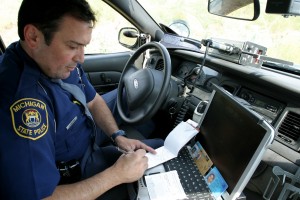State Warrant Query
It is not uncommon for an officer to stop a subject for a traffic violation and discover that they have out-of-state warrants. A majority of states don’t enter all warrants in the National Crime Information Center (NCIC); however, such searches are vital for successful intelligence and background checks, and other important criminal justice purposes.
This article is the sixth in a multi-part series detailing innovative data sets available via Nlets, the International Justice and Public Safety Network. Discussed here: State Warrant Query.
About State Warrants
In 2006, the state of Washington approached Nlets with its need to provide in-state warrant query capabilities to federal agencies in the state. In response, Nlets created the State Warrant Query. In developing the transaction, Nlets also worked closely with the FBI to draft language for related policies, procedures and caveats. The State Warrant Query (SWQ) provides officers the ability to use Nlets to conduct interstate searches of state warrant databases on a national level.
Nlets Washington Representative Heather Anderson comments, “The State Warrant Query is helpful because most misdemeanor warrants and some felonies from bordering states are not included in NCIC. The ability to run the State Warrant Query aids officers and investigators in creating a bigger picture of who they have contacted — it creates yet one more layer of officer safety.”
The Nlets Transaction
The SWQ (query) enables users to obtain state warrant information. A SWR (response) will be returned with the notification that a warrant does or does not exist.
The query requires the following information:
- Valid, nine-character, sending ORI (originating routing indicator);
- Up to any combination of five, two-character destination ORI;
- Name;
- Date of birth;
- FBI number;
- Social Security number;
- Miscellaneous number; and
- Operator’s license number.
The follow data sets are optional for the inquiry format:
- Race; and
- Sex.
Only one data set may be used per inquiry. In other words,if an inquiry is made on the Social Security number, then the user cannot include other fields in the inquiry.
The SWR response is freeform — meaning that each participating state will respond with unique data elements. In addition, the response may contain this caveat: “The following record is in response to a state record query. Please contact the ORI of the record for additional information. This transaction searched only the [X] state database. For a national search, use NCIC.”
Nlets supports this transaction in legacy text, as well as in XML. Participating states include Alabama, Maine, Massachusetts, Michigan, New Hampshire, Ohio and Washington.
Resources
Requests from local agencies interested in using the State Warrant Query message key must be reviewed by the Nlets state representative. Please direct all requests and questions to info@nlets.org.
Chelsea S. Keefer is a document specialist with Nlets, based in Phoenix.
More Articles from Nlets
“Series Introduction”
“International Fuel Tax Association (IFTA) Transaction”
“Coast Guard Vessel Transaction”
“Wildlife Violation Transaction”
“Concealed Weapon Permit Transaction”
“Sex Offender Transactions”
“Aircraft Registration Transaction”
“Parole, Probation & Corrections Transactions”


